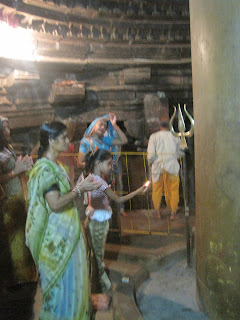1) The flag looks like a Christmas tree. It is, in fact, cedar.
2) Middle East Air will ask you, before issuing you a boarding pass, if you have ever been to Israel.
3) Immigration really does comb your passport for Israeli stamps.
4) Lonely Planet is useless in Lebanon.
5) The Lebanese LOVE German football.
6) There are faaaaaaaar more Lebanese outside the country (mostly in Australia and Brazil) than in the country.
7) Mint leaves in hummus. Good.
8) The Hezbollah “tent city” in downtown Beirut is to be avoided.
9) Due to the rebuilding efforts after some 40-odd years of war, Beirut is new. Like, occasionally, West-Palm-Beach-too-much-sandstone-and-bright-lights new.
10) People carry several different SIM cards. Different hos, different area codes.
11) Colombia is no longer an acceptable fake nationality, due to the Lebanese wanting to talk about cocaine and assuming you are a rich drug dealer. We have moved on to being Argentinian.
12) Palestinian refugees are not allowed to work or live outside of refugee camps. They must attend Palestinian-only schools, and are generally looked upon with much scorn by the Lebanese.
13) Filipinos comprise the majority of household employees and caregivers, while Syrians fill the ranks of construction workers and Sri Lankans often do sanitation work.
14) One of the reasons Amy is stared at so frequently in Lebanon is that most Asians are laborers or caretakers. Because of the lack of tourism, it is VERY rare to see an Asian woman of any means.
15) Lebanon has more than a 20% unemployment rate.
16) Backpackers can be assholes too. Our hostel manager asked us to pay our nights upfront, half apologizing, saying that last week a couple ran out on them in the middle of the night without paying their bill after staying a WEEK. May that couple be cursed with traveler’s diarrhea and faulty plumbing for the rest of their travels.
17) Lebanese glitterati, can, without any sense of irony, be viciously anti-American while wearing American designers, listening to Michael Jackson and buying prints of American celebrities.
18) Patience, when bargaining, is a virtue. Stand around long enough without rushing a decision and the price will drop by at least 30%.
19) Standing on the side of a highway picking up buses can actually be pretty fun.
20) When redeveloping downtown, the crown jewel of post-war redevelopment, city planners kicked out the independent shop owners and instead built a mall. It is sad.
21) Battle of the Hotels. The strip between the former Holiday Inn and another high-rise downtown was one of the deadliest places in downtown Beirut during the war. Snipers used to pick people off from the upper levels of the hotels, while kidnappers would throw their victims off the roofs.
22) People automatically assume you haven’t been to Israel. It is wise not to correct their mistake.
23) Fattoush. Good.
24) Cats. Mangy.
25) The majority of industry in Lebanon is based on trade, much the same as the ancient Phoenicians.
26) A great deal of wealth in the country came from arms trading during the war. As one circumspect local said, “The war made a lot of people in the country really rich. Why do you think it lasted so long?”
27) People do not recycle.
28) Do not wander refugee camps without a local.
29) Power outages. All the time. Often without you knowing it. We were on “emergency” generators at least half the time we were in the country.
30) Due to the unreliable power sources, people charge their personal electronics whenever, wherever. Example: At a hip restaurant in Gemmayze, girls in skintight outfits and giant Gucci bags will order food, then crawl underneath the table to find an outlet and plug in their Iphone.
31) If people give you a “tourist” price, and you just hand them the “local” price, they’ll grudgingly accept it.
32) On the highways, walking through traffic, boys will sell everything from stuffed toy dogs to squeaking handpuppets to swords. Yes, swords.
33) Le Chef is our jam.
34) Shit is fucking complicated.













